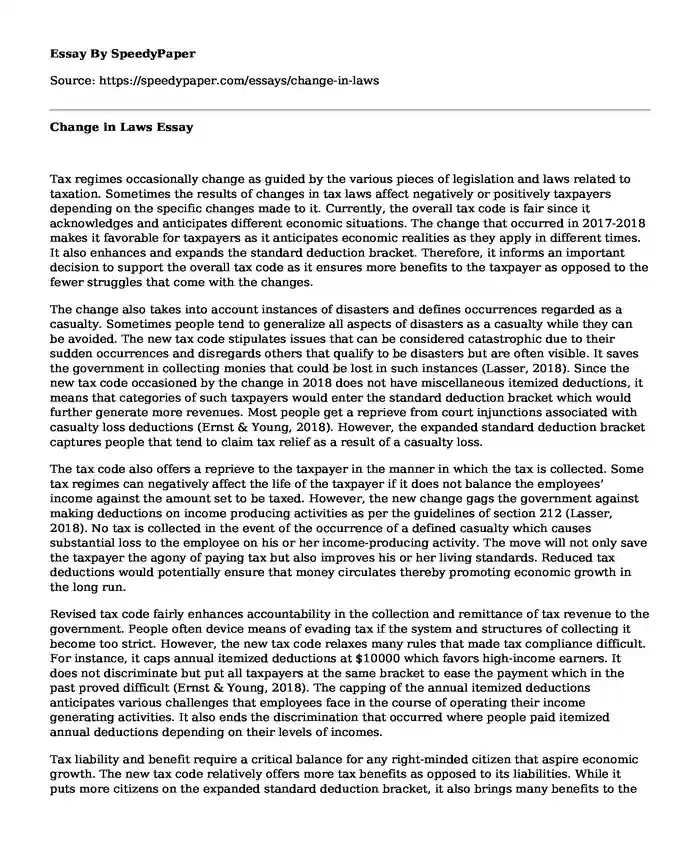
| Type of paper: | Essay |
| Categories: | Education Psychology Personality |
| Pages: | 4 |
| Wordcount: | 835 words |
Tax regimes occasionally change as guided by the various pieces of legislation and laws related to taxation. Sometimes the results of changes in tax laws affect negatively or positively taxpayers depending on the specific changes made to it. Currently, the overall tax code is fair since it acknowledges and anticipates different economic situations. The change that occurred in 2017-2018 makes it favorable for taxpayers as it anticipates economic realities as they apply in different times. It also enhances and expands the standard deduction bracket. Therefore, it informs an important decision to support the overall tax code as it ensures more benefits to the taxpayer as opposed to the fewer struggles that come with the changes.
The change also takes into account instances of disasters and defines occurrences regarded as a casualty. Sometimes people tend to generalize all aspects of disasters as a casualty while they can be avoided. The new tax code stipulates issues that can be considered catastrophic due to their sudden occurrences and disregards others that qualify to be disasters but are often visible. It saves the government in collecting monies that could be lost in such instances (Lasser, 2018). Since the new tax code occasioned by the change in 2018 does not have miscellaneous itemized deductions, it means that categories of such taxpayers would enter the standard deduction bracket which would further generate more revenues. Most people get a reprieve from court injunctions associated with casualty loss deductions (Ernst & Young, 2018). However, the expanded standard deduction bracket captures people that tend to claim tax relief as a result of a casualty loss.
The tax code also offers a reprieve to the taxpayer in the manner in which the tax is collected. Some tax regimes can negatively affect the life of the taxpayer if it does not balance the employees' income against the amount set to be taxed. However, the new change gags the government against making deductions on income producing activities as per the guidelines of section 212 (Lasser, 2018). No tax is collected in the event of the occurrence of a defined casualty which causes substantial loss to the employee on his or her income-producing activity. The move will not only save the taxpayer the agony of paying tax but also improves his or her living standards. Reduced tax deductions would potentially ensure that money circulates thereby promoting economic growth in the long run.
Revised tax code fairly enhances accountability in the collection and remittance of tax revenue to the government. People often device means of evading tax if the system and structures of collecting it become too strict. However, the new tax code relaxes many rules that made tax compliance difficult. For instance, it caps annual itemized deductions at $10000 which favors high-income earners. It does not discriminate but put all taxpayers at the same bracket to ease the payment which in the past proved difficult (Ernst & Young, 2018). The capping of the annual itemized deductions anticipates various challenges that employees face in the course of operating their income generating activities. It also ends the discrimination that occurred where people paid itemized annual deductions depending on their levels of incomes.
Tax liability and benefit require a critical balance for any right-minded citizen that aspire economic growth. The new tax code relatively offers more tax benefits as opposed to its liabilities. While it puts more citizens on the expanded standard deduction bracket, it also brings many benefits to the citizens - the tax exemptions that the new code scraps replace higher deductions on adjusted gross income AGI that existed previously. It instead lowers deductions on medical expenses which potentially make many citizens afford healthcare and associated benefits. It also lowers the cost of owning property since it puts maximum amount charged as acquisition debt. The higher cost of acquisition debt hindered many people from acquiring property through mortgages and loans, but currently, the new tax code is likely to encourage many people into becoming property owners (Lasser, 2018).
In conclusion, the overall impact of the change in law affecting the tax system in 2018 can only be interpreted as a fair one as it enhances lives through the numerous benefits that come with it. It recognizes the inconsistencies that existed previously in tax law which not only inconvenienced taxpayers but affected the government agencies mandated with tax collection. It also defines certain functions in the hope of streamlining revenue collection. The scraping of itemized deductions and reconstituting casualty deductions aim at improving lives. Rationally, the change empowers employees and income earners to a greater extent that evading tax becomes untenable. Despite a negative effect that disregarding or scraping many instances of tax deductions can cause, the change cannot be ignored as it proves worthwhile in meeting tax expectation for the general public and government. Finally, the change expands the standard deduction bracket thereby generating more revenues to the government.
References
Ernst & Young, (2018). The EY Tax Guide 2018. Hoboken, New Jersey: Wiley.
Lasser, J. K. (2018). J.K. Lasser's Your Income Tax 2019: For Preparing Your 2018 Tax Return. S.l.: JOHN WILEY.
Cite this page
Change in Laws. (2022, Oct 25). Retrieved from https://speedypaper.net/essays/change-in-laws
Request Removal
If you are the original author of this essay and no longer wish to have it published on the SpeedyPaper website, please click below to request its removal:
- Black Latino Study: Kolanuts Essay Sample
- Essay Example on Traditional Chinese Medicine
- Essay Sample Analyzing Dr. King's Letter from Birmingham Jail
- Kafka's The Metamorphosis Analysis Free Essay
- Essay Sample: Why Animal life Matters
- Essay Example: Aging Population Statistics
- Give Me the Wall; I'll Give You Dreamers. Paper Example
Popular categories




